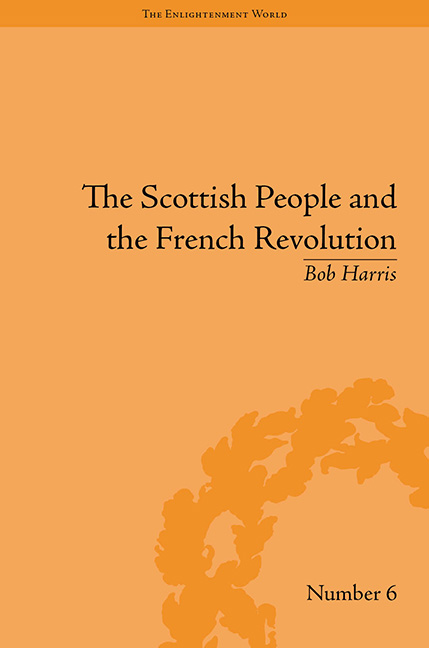Book contents
- Frontmatter
- CONTENTS
- Preface
- Introduction
- 1 The Eighteenth-Century Roots of Scottish ‘Jacobin’ Politics
- 2 Newspapers, the French Revolution and Public Opinion
- 3 ‘The True Spirit of Liberty’: Scottish Radicals, 1792–4
- 4 Checking the Radical Spirit
- 5 Volunteers, the Militia and the United Scotsmen, 1797–8
- 6 Bread, Dearth and Politics, 1795–1801
- Conclusion
- Notes
- Works Cited
- Index
3 - ‘The True Spirit of Liberty’: Scottish Radicals, 1792–4
- Frontmatter
- CONTENTS
- Preface
- Introduction
- 1 The Eighteenth-Century Roots of Scottish ‘Jacobin’ Politics
- 2 Newspapers, the French Revolution and Public Opinion
- 3 ‘The True Spirit of Liberty’: Scottish Radicals, 1792–4
- 4 Checking the Radical Spirit
- 5 Volunteers, the Militia and the United Scotsmen, 1797–8
- 6 Bread, Dearth and Politics, 1795–1801
- Conclusion
- Notes
- Works Cited
- Index
Summary
This chapter examines the rise and fall of Scottish reform politics and radicalism as an open force between 1792 and 1794. To even talk of Scottish radicalism, however, in an unqualified sense may be a misnomer, other than from the very obvious perspective that Scottish radicals and radicalism were organized on a national (meaning Scottish) basis, more so than English radicalism, and Scottish distinctiveness – in religion, for example – inevitably impressed itself on radical views and outlooks. On the other hand, the salient question may be why the distinctively Scottish component was so negligible; or so British, for seemingly the overwhelming majority of Scottish reformers and radicals saw themselves as partners in a cause that was both British and more than British. The ‘cause of liberty’ was the ‘cause of mankind’ universalist languages intertwined with national ones in radical circles with no sense of contradiction. Thomas Muir, the radical martyr, may have talked of ancient Scottish liberty being fuller than its English equivalent, and some radicals called on the Claim of Right (1689) – the Scottish more-than equivalent to the English Bill of Rights – to vindicate their right to petition in defence of reform, but in doing so they were not challenging the notion that liberty was to be created through a reformed Westminster Parliament, or that by the term ‘people’ was meant people throughout Britain. As we will see further below, from the inception of a parliamentary reform movement in Scotland, alignment and connection with English or English-based reformist and radical organizations were crucial, and this dimension only increased over time, partly in response to political repression throughout the British Isles.
A crucial thread in what follows, therefore, is interaction and interconnection between Scottish and English and, to a rather lesser extent, Irish popular politics in this period. In exploring the Scottish radical movement of these years, the chapter also seeks to do justice, however, to the experiences of reformers and radicals as they sought to develop and define their views and strategies against a very rapidly shifting domestic and international political background.
- Type
- Chapter
- Information
- The Scottish People and the French Revolution , pp. 75 - 114Publisher: Pickering & ChattoFirst published in: 2014



